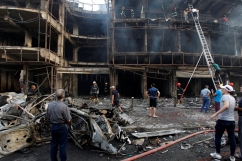Islamic State fighters reportedly captured up to 3,000 fleeing Iraqi villagers on Thursday and subsequently executed 12 of them, the UN refugee agency UNHCR has said.
The claims – in the UNHCR's daily report on Iraq – followed a statement on Thursday from the Iraqi Observatory for Human Rights, which said about 1,900 civilians had been captured by an estimated 100-120 Islamic State fighters, who were using people as shields against attacks by Iraqi Security Forces. Tens of civilians had been executed, and six burnt according to the Reuters news agency.
"UNHCR has received reports that ISIL captured on 4 August up to 3,000 IDPs (internally displaced people) from villages in Hawiga District in Kirkuk Governorate trying to flee to Kirkuk city. Reportedly, 12 of the IDPs have been killed in captivity," the UNHCR report said.
A brutal advance by Islamic State in 2014 saw some 80,000 Christian refugees flee Mosul and the Nineveh Plain under threat of forced conversion or execution. The US is leading a military coalition conducting air strikes against Islamic State in Iraq and Syria. The fighting had displaced 3.4 million people in Iraq by July 2016.
Last month the UN appealed for $284 million to prepare aid for an assault on Mosul, an Islamic State stronghold, as well as up to $1.8 billion to deal with the aftermath.
It has so far received nothing in response, according to the UN Financial Tracking Service.
UNHCR has begun building a site north-east of Mosul for 6,000 people and is preparing another north-west of the city for 15,000, a fraction of those expected to need shelter.
Tens of thousands who fled from the city of Falluja have still not returned since its recapture from Islamic State in June. Three volunteers helping to clear Falluja of rubble and explosives died while clearing a house on 1 August, UNHCR said.
"Although local authorities have suggested that returns to Falluja could begin in September, the Ministry of Migration and Displacement has stated that it may take another three months before conditions are conducive for large scale returns," it said.
Additional reporting by Reuters.
















